 Call it revenge of the death penalty states.
Call it revenge of the death penalty states.
Only days after UNODC Executive Director, Antonio Maria Costa, used his opening speech at the 51st session of the Commission on Narcotic Drugs to raise the issue of human rights and call for an end to the death penalty for drug offences, a coalition of death penalty countries banded together to seek to block a ground-breaking human rights resolution.
The resolution - entitled “Proper integration of the United Nations human rights system with international drug control policy”- was introduced by Uruguay with the co-sponsorship of Bolivia, Argentina and Switzerland. The first resolution of its kind at CND, it recognised the 60th anniversary of the Universal Declaration of Human Rights (an event being celebrated throughout the UN system during 2008) and affirmed "that international drug control activities must be conducted in conformity with international human rights law". The resolution requested UNODC "to work closely towards those ends with the Office of the High Commissioner for Human Rights and...the Human Rights Council."
On Thursday 13 March, this draft resolution was taken to the "Committee of the Whole" at CND, where the wording of draft resolutions is debated, amended and (hopefully) agreed by consensus before being brought back to the full CND plenary session for approval. It was here that a small coalition of states sought to block, or at least undermine, the resolution.
Leading the charge was China, which stated that “Discussion of political issues such as human rights are inappropriate at CND”. China questioned whether it was within the mandate of CND to celebrate the 60th anniversary of the Universal Declaration, and stated that “It is not appropriate to address human rights within the mission of CND, and it is not appropriate to address this resolution in this session.”
Joining China in opposing even consideration of the resolution were Japan, Nigeria, Iran and Thailand. Cuba ensured that a specific statement against the death penalty for drug offences was removed from the draft before it even reached committee debate.
Speaking in full support of the resolution were Uruguay, the UK, Italy, Bolivia, Argentina, Romania, France, the Netherlands, Norway, Belgium, Switzerland, Finland, Germany, Spain, Slovenia, Ireland and Peru.
The United States, although stating that “We are all very passionately committed to human rights”, did its best to water down the wording of the resolution as much as possible. This was a similar approach to that taken by Egypt, which while not speaking directly in opposition to the resolution introduced numerous procedural and wording changes intended to dilute its human rights focus. Canada expressed support for the resolution, although later joined the US in blocking reference within it to the UN Declaration on the Rights of Indigenous Peoples.
The audience observing the debate was treated to some often unbelievable statements from delegates officially representing their governments at a high level UN meeting.
China, for example, stated that "It is ridiculous to require us [meaning the CND] to work in accordance with human rights law."
Nigeria told the delegations that "We should not be carried away by sentiment” in supporting the resolution, and asked "What do we mean by the United Nations human rights system?”
Not to be outdone in the "Who knows least about the UN system" contest, Japan asked what the term "international drug control" meant in the resolution, then questioned whether the Universal Declaration of Human Rights is international law. (It is, and for the information of our distinguished Japanese colleagues they can find out more about it on the International Law section of the Office of the High Commissioner of Human Rights website.)
Thailand worried that discussion of human rights was the job of the UN in Geneva (where the human rights offices are located) rather than Vienna (where CND meets). The Thai delegation stated that “If we bring in the issue of human rights within CND, it will disrupt the tradition of consensus" decision-making within the Commission.
On the second point at least IHRA couldn't agree more, which is why our statement before the CND plenary on Tuesday called for an end to consensus, and the use of majority voting, on human rights issues. This would end the type of ridiculous scenario witnessed on Thursday when a small handful of countries were allowed to block a resolution that would have easily passed if voted on.
On the other side, the UK delegation played a leading role in defending the resolution, pointing out that the primacy of human rights over drug control within international law was "clear and unambiguous". They stated that as a functional commission of the Economic and Social Council of the UN, human rights is squarely within CND's mandate. The UK also clarified for the benefit of the Japanese delegation that not only is the Universal Declaration international law, it "verges on customary law".
The Netherlands delegation noted that the issue of human rights was “Important enough for Executive Director Costa to bring it up in his opening, so I see no reason why we should not discuss it here.” In reply to statements from some of the resolution's opponents who claimed not to know what the term human rights meant, the delegate stated that “Human rights are very well defined, so I don’t see why people would ask what are human rights.”
Switzerland, one of the resolution's co-sponsors, argued that “Human rights are not just something we defend in Geneva or a goal we seek to attain. They are a profound belief at the heart of the UN system.”
Argentina, another co-sponsor, stated that one of the main aims of the international community is the promotion of Universal Declaration, which it described as "one of the great achievements of the international community". They pointed out that drug control is a very broad field that touches on many areas of human rights protections, including the right to health and the right to life.
Bolivia argued that the resolution was important so that "fundamental human rights are not lost sight of in the fight against drugs".
The resolution, with new wording based upon this debate, is due to come back to the Committee of the Whole on Friday. The HR2 blog will be there and will keep you posted.
Thanks to Steve Rolles of Transform Drug Policy Foundation for the photo of the CND Committee of the Whole.
Friday, 14 March 2008
“Discussion of political issues such as human rights are inappropriate at CND” – China leads charge against human rights resolution
Tuesday, 11 March 2008
CND day 2 - IHRA statement on human rights and harm reduction during plenary debate on demand reduction
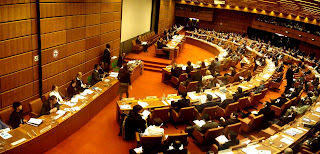 This afternoon, during the second day of the 51st session of the Commission on Narcotic Drugs, IHRA's Senior Policy Advisor, Rick Lines (at bottom left of the photo-click on image to get full size) addressed delegates during a plenary debate on demand reduction.
This afternoon, during the second day of the 51st session of the Commission on Narcotic Drugs, IHRA's Senior Policy Advisor, Rick Lines (at bottom left of the photo-click on image to get full size) addressed delegates during a plenary debate on demand reduction.
A copy of IHRA's statement is below.
"Each December, the UN General Assembly adopts a resolution entitled 'International cooperation against the world drug problem'. This resolution states that drug control activities must be 'carried out in full conformity with the purposes and principles of the Charter of the United Nations and…with full respect for…all human rights and fundamental freedoms'.
This resolution of the UN’s highest policy-setting body directs CND to prioritise human rights. Yet to date, mention of human rights has been almost completely absent from CND’s work. In effect, CND has failed in its obligation to take direction from the General Assembly.
This year agencies across the UN system celebrate the 60th anniversary of the Universal Declaration of Human Rights. And in this year we see hope for change.
We welcome Mr. Costa’s comments yesterday on the need to promote human rights in drug control activities, including the need to end the death penalty for drug offences. We welcome the statement in INCB’s most recent Annual Report that 'Due respect for universal human rights…is important' and that 'Non-respect…can undermine the conventions.'
Such words are important. But words are not enough. True leadership comes only when words are turned into action. We need action from CND to ensure that international human rights law is placed at the heart of its work.
What does human rights leadership from CND mean?
Human rights leadership means taking action to promote the right to health. For example, last year the UN Special Rapporteur on the Right to Health affirmed that the provision of harm reduction programmes is a necessary part of State obligations to fulfill the right to health. In this context, human rights leadership means that CND must robustly and unambiguously support harm reduction measures such as syringe exchange, opioid substitution treatment and safe injecting rooms, among other interventions. It also means ensuring that drug treatment programmes are voluntary and not coercive. It means that statements from drug control bodies like INCB are based on evidence and human rights obligations, and that affirmative action is taken to correct misinformation.
Leadership also means taking action to prevent human rights abuses in the name of drug control before they occur, and speaking out when there is legitimate fear of imminent human rights violations.
For example, in recent weeks, there have been indications from the Royal Thai government that it plans to resume its 'war on drugs'. It is important that UN agencies and Member States seek clarification of the government’s intentions in this regard. However, recent public comments by a government Minister have raised fears among many that the State intends to relaunch the campaign of extrajudicial killings seen in 2003, in which over 2,800 people were killed. This campaign was criticised by the UN Human Rights Committee, among other human rights monitors. Leadership on human rights means that CND and Member States must speak out clearly against abusive 'drug-control' policies wherever they occur.
Leadership on human rights means ensuring that UN-sponsored drug control activities have the promotion of human rights as key performance indicator, one fully integrated into programme planning and evaluation. We enjoin CND to ensure that UN drug control agencies undertake human rights impact assessments of all activities prior to their approval and implementation, as well as during and after the approved activities have begun. Only through such a process of assessment and monitoring can we be certain that UN-sponsored drug enforcement programmes do not result in human rights violations, and that they effectively promote the respect and fulfillment of human rights and the rule of law that is central to the UN’s mission.
Finally, leadership on human rights means using the democratic majority voting mechanism provided for CND under ECOSOC in cases where consensus is not possible on human rights issues, and ending the current status quo where a small handful of Member States are allowed to block human rights language in CND resolutions. This status quo undermines the promotion and protection human rights, a mission fundamental to the object and purpose of the UN. When consensus is not achievable, CND Members must vote and let the world see which States are willing to stand up to support human rights, and which are not.
In this 60th anniversary year of the Universal Declaration of Human Rights, we can no longer allow the 'spirit of Vienna' to undermine the spirit of the Declaration."
Thanks to Steve Rolles at Transform Drug Policy Foundation for the photo.
Monday, 10 March 2008
CND day 1 - UNODC chief calls for end to the death penalty for drug offences and a greater focus on human rights
 The International Harm Reduction Association has welcomed today's statement by UNODC Executive Director, Antonio Maria Costa, calling for an end to capital punishment for drug offences, and a greater focus on human rights in drug enforcement activities.
The International Harm Reduction Association has welcomed today's statement by UNODC Executive Director, Antonio Maria Costa, calling for an end to capital punishment for drug offences, and a greater focus on human rights in drug enforcement activities.
Speaking this morning at the opening session of the 51st Commission on Narcotic Drugs (CND) meeting in Vienna, Mr. Costa said:
"Finally, but certainly not least, human rights. Our work is guided first and foremost by the UN Charter that commits signatories to fundamental freedoms, and by the Universal Declaration of Human Rights, 60 years old this year.
In Article 25 of the Universal Declaration, health is listed as a basic human right. As we emphasize the health aspects of drug control, it stands to reason that implementation of the drug Conventions must proceed with due regard to human rights. Thus far, there has been little attention paid to this aspect of our work. This definitely needs to be amended.
Although drugs kill, I don't believe we need to kill because of drugs.
The UN drug Conventions have left it to individual states to deal with health care and crime retribution, in relation with specific cultural and judicial contexts. Mindful of this, today I propose that Member States extend the concept of harm reduction to include the need to give serious consideration to whether the imposition if capital punishment for drug-related crimes is a best practice.
The recent General Assembly moratorium suggests a way forward. More must be done to bridge the gap between international standards and the right of individual nations to decide in this difficult area. As the custodian of the judicial standards and norms set by the World Crime Congresses, UNODC insists on the importance of translating them into national laws and practice."
IHRA's HR2 programme has been doing extensive work on the issue of the death penalty for drugs over the past year, including publishing a major report in December and meeting with Mr. Costa in Vienna in February. Later today, IHRA's Senior Policy Advisor, Rick Lines, will be speaking on the death penalty for drugs at a CND luncheon briefing session on human rights organised by NGOs.
Monday, 3 March 2008
Recalibrating the Regime: The Need for a Human Rights-Based Approach to International Drug Policy - Beckley Foundation Report 13
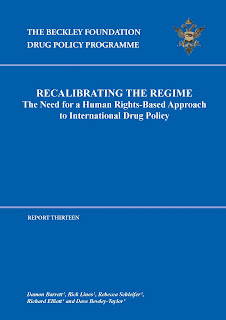
This new report, co-authored by the HR2 team, looks at the tensions between some aspects of the global drug control system and international human rights law. The report highlights that, despite numerous instances of human rights abuses perpetrated in the name of drug control, there has been little engagement with this issue by the responsible bodies, the UNODC, INCB and the human rights treaty bodies.
The report was published by the Beckley Foundation Drug Policy Programme, and is co-authored by IHRA, Human Rights Watch and the Canadian HIV/AIDS Legal Network.
Monday, 11 February 2008
“Deadly Serious: Drugs and Capital Punishment in the 21st century” by David Gilliver, Drink and Drugs News
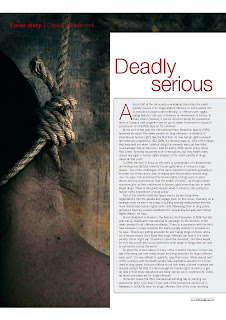
The new issue of Drink and Drugs News – the leading magazine for substance misuse professionals in the UK - features a cover story on the issue of the death penalty for drug offences. Entitled “Deadly Serious: Drugs and Capital Punishment in the 21st century”, the article features extensive commentary on the issue from IHRA’s Senior Policy Advisor, Rick Lines.
Monday, 10 December 2007
IHRA launches report on the death penalty for drug offences
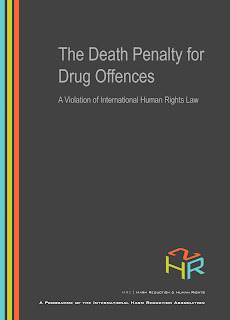 On 10th December 2007 – to coincide with International Human Rights Day – IHRA released a major report calling for an end to the use of the death penalty for drug offences around the world. The report concludes that the on-going execution of drug offenders is a violation of international human rights law.The report is entitled ‘The Death Penalty for Drug Offences: A Violation of International Human Rights Law’ and was written by Rick Lines.
On 10th December 2007 – to coincide with International Human Rights Day – IHRA released a major report calling for an end to the use of the death penalty for drug offences around the world. The report concludes that the on-going execution of drug offenders is a violation of international human rights law.The report is entitled ‘The Death Penalty for Drug Offences: A Violation of International Human Rights Law’ and was written by Rick Lines.
It is the first major report from HR2, IHRA’s new harm reduction and human rights monitoring and policy analysis programme. The report emphasises how the harms faced by people who use drugs do not only include health harms such as HIV and hepatitis C infections, but also the effects of repressive law enforcement activities. While the number of countries practicing capital punishment has steadily decreased over the past twenty years, this report demonstrates that the number of countries using the death penalty for drug offences has steadily increased.Across the world, 133 countries have abolished the death penalty in law or in practice. However, of the 64 countries that have retained capital punishment, half of which apply these punishments to drug-related offences (whether they be drug possession or drug trafficking offences). In one of the most shocking examples, the Chinese Government celebrates the United Nation’s ‘International Day Against Drug Abuse and Illicit Trafficking’ each year by publicly executing people for drug-related crimes.The International Covenant on Civil and Political Rights (ICCPR) - one of the main UN human rights treaties – states that the death penalty may only be applied to the “most serious crimes”. Both the UN Human Rights Committee and the UN Special Rapporteur on Extrajudicial, Summary or Arbitrary Executions have stated that drug offences do not constitute “most serious crimes” - making executions for such offences a violation of international human rights law.Commenting on the report launch, Professor Gerry Stimson (IHRA’s Executive Director) said, “Capital punishment for drug offences is but one illustration of how human rights have been sacrificed in the name of the ‘war on drugs’. Unfortunately, the death penalty is not the only example of such abuses worldwide. Repressive law enforcement practices, the denial of health services to drug users and the spread of HIV infection among people who inject drugs, due to lack of access to harm reduction programmes, are far too common in many countries across the globe.”
Friday, 3 August 2007
"The Ultimate Price: The death penalty for drugs" in Druglink magazine
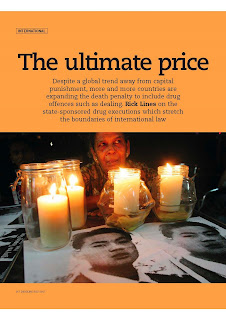
The new issue of Druglink magazine features an article on the death penalty for drug offences by Rick Lines, IHRA's Senior Policy Advisor. Druglink is a bi-monthly magazine for all those UK professionals interested in drugs and drug-related issues whether it's treatment, public health, education and prevention, criminal justice or international.


